Justice and safer communities statistics: monthly data report summary - October 2024
Summary statistics covering a number of important justice and safer communities areas. It is published with up to date statistics every month.
Justice Journey Times
Summary statistics on journey times in the Scottish criminal justice system
Journey times in the Scottish Criminal Justice system. The percentage of accused reported to COPFS which were not marked for prosecution in court and had their cases closed within one year of the offence being committed, has been falling since 2019-20 but increased slightly over the last year from 78% in 2022-23 to 80% in 2023-24. For accused prosecuted in criminal courts, up to and including 2019-20, 83-84% of accused had a disposal issued within one year of the offence being committed. This fell to 57% in year 2022-23 but increased to 61% in 2023-24.
Median journey times (from offence date to case closed), for cases closed by COPFS, increased post pandemic and were longer for accused marked as “no Action”. In general, median journey times for accused persons with a COPFS “no action” marking were longer than for accused people marked for direct measures (e.g. a warning letter or a fiscal fine). This difference has decreased in year 2023-24 where the median journey time was 189 days for cases marked no action and 161 days for cases marked for direct measures.
Median journey times for accused prosecuted by courts (from offence date to verdict) increased post pandemic. Median journey times decreased for all court types in 2023-24 when compared to 2022-23 with the exception of sheriff solemn. There were falls of 4% for high court (from 1,076 to 1,032 days), 18% for sheriff summary (from 306 to 252 days) and 6% for justice of the peace (JP) (from 303 to 286 days). Sheriff solemn journey times increased by 7% (from 529 to 564 days).
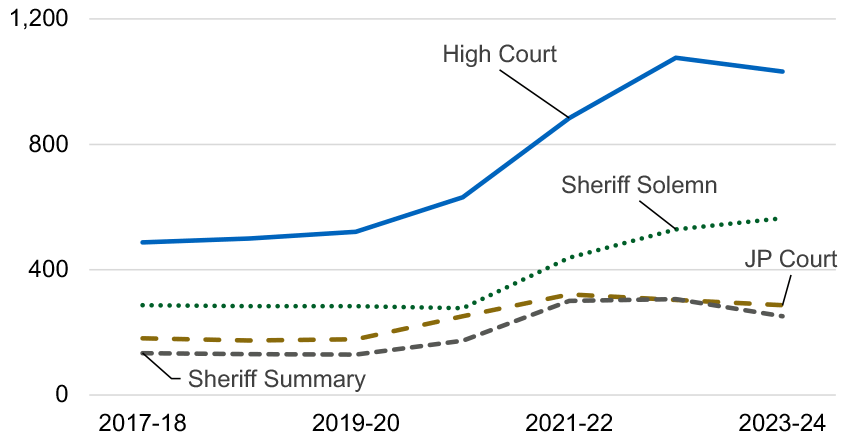
The time associated with different parts of an accused person’s journey in the justice system varies depending on the type of court their case is allocated. The data available allow for overall journey times to be split into: date of offence to the date an offence is first known to police (offence to police known), date an offence is first known to police to the date an offence is recorded at COPFS (police known to COPFS record), date an offence is recorded at COPFS to the date a case is registered in court (COPFS report to court registration) and date a case is registered in court to the date a verdict is reached (court registration to verdict). The median offence to police known for accused with verdicts issued in high court was 3 days in 2023-24 and 0 for accused with verdicts in other courts. The median police known to COPFS report time ranged from 3 days for accused with verdicts issued in sheriff solemn court to 60 days in 2023-24 for accused with verdicts issued in JP court. The median time from COPFS report to court registration is, in general higher, for accused with verdicts issued in solemn courts than for the accused disposed in summary courts. For accused disposed in solemn courts, these times have further increased in 2023-24 compared to 2022-23. For high court there was a 14% increase to 491 days and for sheriff solemn court there was an 11% increase to 294 days. COPFS report to court registration times for accused disposed in sheriff summary court remained stable (median time 24 days) in 2023-24 and JP courts median times decreased by 23% to 80 days. In-court times (court registration to verdict) saw a decrease in 2023-24 compared to 2022-23 in all court types except the high court where times remained stable: High court remained at 323 days, sheriff solemn court decreased by 9% to 117 days, sheriff summary court decreased by 25% to 124 days and JP court decreased by 7% to 65 days.
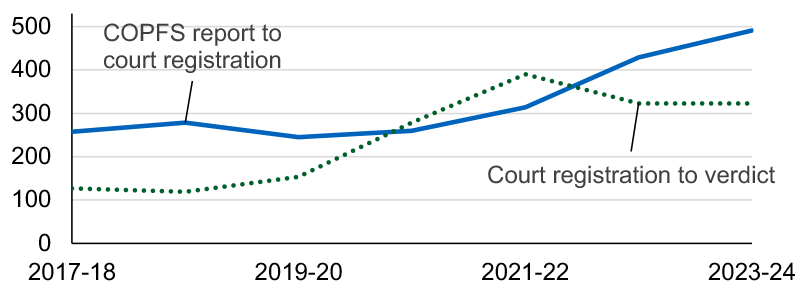


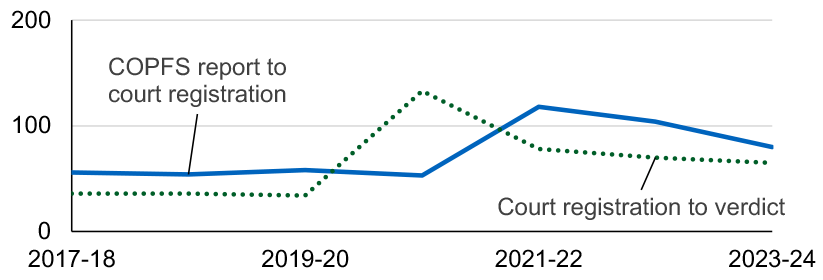
There were differences in accused persons’ journey times depending on the type of crime on registration. The longest journey times were observed for accused people charged with at least one sexual crime and verdict issued in high court. These times can now be split into historic and non-historic sexual offences. The median offence to verdict time for accused in the historic sexual crimes group in high court in 2023-24 was around 11 years. This has reduced from around 13 years and 4 months in 2022-23 (-18%). In sheriff solemn court, the median journey times for this group were around half this value, increasing from around 7 years and 5 months in 2022-23 to around 8 years and 2 months in 2023-24 (10%).The median offence to verdict times for accused in the non-historic sexual crimes group remained largely stable in high court, at just over 3 years in 2023-24. This has increased by 9% in sheriff solemn court from around 1 year 7 months in 2022-23 to around 1 year 9 months in 2023-24. The longest median offence to verdict times for crimes classified as sexual crimes are for rape and attempted rape. As mentioned earlier, the median offence to verdict time for all sexual crimes cases is influenced by the proportion of historic cases reaching a verdict and the time in which those cases reach a verdict. The median offence to verdict times for accused with historic rape and attempted rape offences are much higher than the times for non-historic offences. In 2023-24, for non-historic offences, the median offence to verdict time remained stable at around 3 years. For accused with historic offences, median journey time decreased by 9% in 2023-24 to around 10 years and 8 months.
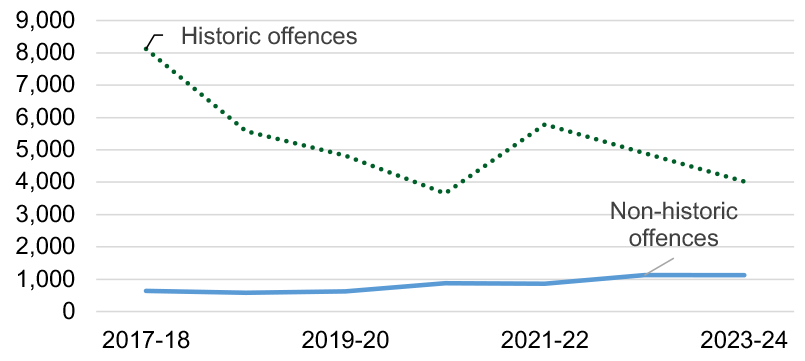
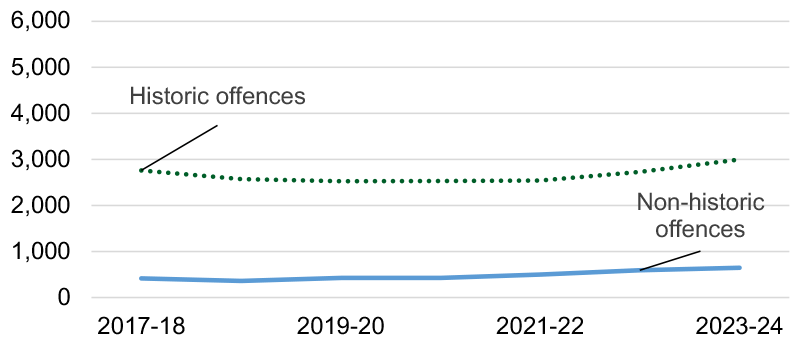
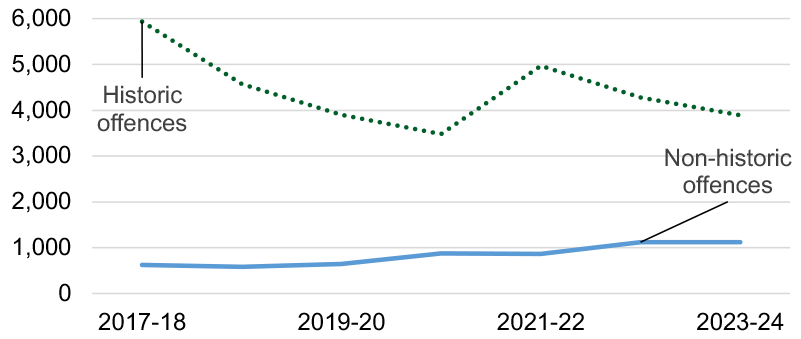
Contact
Email: justice_analysts@gov.scot
There is a problem
Thanks for your feedback